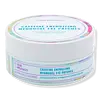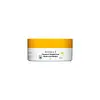What's inside
What's inside
 Key Ingredients
Key Ingredients

 Benefits
Benefits

 Concerns
Concerns

 Ingredients Side-by-side
Ingredients Side-by-side

Water
Skin ConditioningGlycerin
HumectantNiacinamide
SmoothingCarrageenan
Caffeine
Skin ConditioningAcetyl Tetrapeptide-5
HumectantCeratonia Siliqua Gum
EmollientCyamopsis Tetragonoloba Gum
Emulsion StabilisingCellulose Gum
Emulsion StabilisingRicinus Communis Seed Oil
MaskingGlucomannan
Skin ConditioningAllantoin
Skin ConditioningSodium Hyaluronate
HumectantAstragalus Membranaceus Root Extract
EmollientGlycyrrhiza Uralensis Root Extract
Skin ConditioningCamellia Sinensis Leaf Extract
AntimicrobialAloe Barbadensis Leaf Juice
Skin ConditioningButylene Glycol
HumectantCalcium Lactate
AstringentSucrose
HumectantCalcium Chloride
AstringentPotassium Chloride
Arginine
MaskingPhenoxyethanol
PreservativeSodium Benzoate
Masking1,2-Hexanediol
Skin ConditioningCaprylyl Glycol
EmollientPolyglyceryl-4 Caprate
EmulsifyingWater, Glycerin, Niacinamide, Carrageenan, Caffeine, Acetyl Tetrapeptide-5, Ceratonia Siliqua Gum, Cyamopsis Tetragonoloba Gum, Cellulose Gum, Ricinus Communis Seed Oil, Glucomannan, Allantoin, Sodium Hyaluronate, Astragalus Membranaceus Root Extract, Glycyrrhiza Uralensis Root Extract, Camellia Sinensis Leaf Extract, Aloe Barbadensis Leaf Juice, Butylene Glycol, Calcium Lactate, Sucrose, Calcium Chloride, Potassium Chloride, Arginine, Phenoxyethanol, Sodium Benzoate, 1,2-Hexanediol, Caprylyl Glycol, Polyglyceryl-4 Caprate
Water
Skin ConditioningGlycerin
HumectantCarrageenan
Niacinamide
SmoothingButylene Glycol
HumectantSodium Hyaluronate
HumectantHydrolyzed Collagen
EmollientCocos Nucifera Fruit Extract
EmollientPinus Sylvestris Leaf Extract
TonicCeratonia Siliqua Gum
EmollientAllantoin
Skin ConditioningCaffeine
Skin ConditioningBrassica Oleracea Capitata Leaf Extract
Skin ConditioningBrassica Oleracea Italica Extract
AstringentSolanum Lycopersicum Fruit Extract
AntioxidantMica
Cosmetic ColorantCyamopsis Tetragonoloba Gum
Emulsion StabilisingArginine
MaskingChlorphenesin
AntimicrobialCellulose Gum
Emulsion StabilisingTitanium Dioxide
Cosmetic ColorantCI 77491
Cosmetic ColorantTin Oxide
AbrasiveCaprylyl Glycol
EmollientDipotassium Glycyrrhizate
HumectantHydrolyzed Elastin
EmollientHydroxyacetophenone
AntioxidantSucrose
HumectantAscorbic Acid
Antioxidant1,2-Hexanediol
Skin ConditioningHexylene Glycol
EmulsifyingPropanediol
SolventPentylene Glycol
Skin ConditioningDextrin
AbsorbentCyclodextrin
AbsorbentPolyglyceryl-10 Laurate
Skin ConditioningCalcium Chloride
AstringentDisodium EDTA
Ethylhexylglycerin
Skin ConditioningWater, Glycerin, Carrageenan, Niacinamide, Butylene Glycol, Sodium Hyaluronate, Hydrolyzed Collagen, Cocos Nucifera Fruit Extract, Pinus Sylvestris Leaf Extract, Ceratonia Siliqua Gum, Allantoin, Caffeine, Brassica Oleracea Capitata Leaf Extract, Brassica Oleracea Italica Extract, Solanum Lycopersicum Fruit Extract, Mica, Cyamopsis Tetragonoloba Gum, Arginine, Chlorphenesin, Cellulose Gum, Titanium Dioxide, CI 77491, Tin Oxide, Caprylyl Glycol, Dipotassium Glycyrrhizate, Hydrolyzed Elastin, Hydroxyacetophenone, Sucrose, Ascorbic Acid, 1,2-Hexanediol, Hexylene Glycol, Propanediol, Pentylene Glycol, Dextrin, Cyclodextrin, Polyglyceryl-10 Laurate, Calcium Chloride, Disodium EDTA, Ethylhexylglycerin
 Reviews
Reviews

Ingredients Explained
These ingredients are found in both products.
Ingredients higher up in an ingredient list are typically present in a larger amount.
1,2-Hexanediol is a synthetic liquid and another multi-functional powerhouse.
It is a:
- Humectant, drawing moisture into the skin
- Emollient, helping to soften skin
- Solvent, dispersing and stabilizing formulas
- Preservative booster, enhancing the antimicrobial activity of other preservatives
Allantoin is a soothing ingredient known for its protective and moisturizingg properties. Because of this, it is often added to products with strong active ingredients.
Studies show higher concentrations of this ingredient can promote wound healing.
Though it can be derived from the comfrey plant, allantoin is produced synthetically for cosmetic products to ensure purity.
Learn more about AllantoinArginine is an amino acid that is important for human development. Your body uses is it to produce hair keratin and skin collagen.
As a cosmetic ingredient, Arginine has antioxidant properties and can also help repair damaged skin. This ingredient is derived either synthetically or from animals.
Arginine isn't fungal acne safe when used in the presence of other lipids (fats, fatty acids, oils, esters, etc). Oils and fats occur naturally within the skin, so take caution when using Arginine if you're prone to fungal acne.
Learn more about ArginineButylene Glycol (or BG) is used within cosmetic products for a few different reasons:
Overall, Butylene Glycol is a safe and well-rounded ingredient that works well with other ingredients.
Though this ingredient works well with most skin types, some people with sensitive skin may experience a reaction such as allergic rashes, closed comedones, or itchiness.
Learn more about Butylene GlycolCaffeine is most associated with coffee, tea, and cacao. In skincare, it helps with calming inflammation and is rich in antioxidants.
While caffeine is used to treat cellulite and and dark circles, further studies are needed to prove this. It has been believed to help with these skin conditions due to its ability to dilate blood vessels and increase blood flow.
Some studies are looking into caffeine's ability to protect against UV rays.
Learn more about CaffeineCalcium chloride is a white, odorless, crystalline solid. It is an astringent and can be used to change the viscosity of products.
This ingredient is highly soluble in water, acetic acid, and ethanol.
There are many forms of this ingredient, including monohydrate, dihydrate, tetrahydrate, and hexahydrate.
Learn more about Calcium ChlorideCaprylyl Glycol is a humectant and emollient, meaning it attracts and preserves moisture.
It is a common ingredient in many products, especially those designed to hydrate skin. The primary benefits are retaining moisture, skin softening, and promoting a healthy skin barrier.
Though Caprylyl Glycol is an alcohol derived from fatty acids, it is not the kind that can dry out skin.
This ingredient is also used as a preservative to extend the life of products. It has slight antimicrobial properties.
Learn more about Caprylyl GlycolCarrageenan comes from red seaweed or algae. It is made up of polysaccharides and a highly flexible compound. Red algae cell walls are rich in carrageenan.
In cosmetics, it helps to thicken the texture. Studies show carrageenan extracted from red algae possess antioxidant properties. Components found in carrageenan include: lipids, fatty acids, Vitamin E, proteins, and several amino acids.
Learn more about different types of algae.
Carrageenan is also commonly used in medicine and food. It is a vegan alternative to animal-based gelatin.
Learn more about CarrageenanCellulose Gum is a water-soluble polymer that comes from cellulose. It is used to change the texture of a product and to help stabilize emulsions.
As an emulsifier, cellulose gum specifically thicken the texture of water-based products.
This ingredient is considered hypoallergenic and non-toxic. Cellulose Gum can be found in cosmetics, food, and other household goods such as paper products.
Learn more about Cellulose GumCeratonia Siliqua Gum is extracted from the seeds of the carob tree. You might know this ingredient as Carob Gum or Locust Bean Gum. It is used to stabilize other ingredients and improve the texture of products.
Carob gum is made up of long-chain polysaccharides. This makes it a natural thickener.
Yes! This ingredient comes from the seeds of a tree. The name 'Locust Bean Gum' can be misleading.
Learn more about Ceratonia Siliqua GumGuar gum is made from the guar bean, a plant native to India. It is considered a form of polysaccharide and naturally contains sugar.
This ingredient is often used to thicken a product or create a gel-like consistency.
It also has emulsion properties to help keep ingredients together.
Learn more about Cyamopsis Tetragonoloba GumGlycerin is already naturally found in your skin. It helps moisturize and protect your skin.
A study from 2016 found glycerin to be more effective as a humectant than AHAs and hyaluronic acid.
As a humectant, it helps the skin stay hydrated by pulling moisture to your skin. The low molecular weight of glycerin allows it to pull moisture into the deeper layers of your skin.
Hydrated skin improves your skin barrier; Your skin barrier helps protect against irritants and bacteria.
Glycerin has also been found to have antimicrobial and antiviral properties. Due to these properties, glycerin is often used in wound and burn treatments.
In cosmetics, glycerin is usually derived from plants such as soybean or palm. However, it can also be sourced from animals, such as tallow or animal fat.
This ingredient is organic, colorless, odorless, and non-toxic.
Glycerin is the name for this ingredient in American English. British English uses Glycerol/Glycerine.
Learn more about GlycerinNiacinamide is a multitasking form of vitamin B3 that strengthens the skin barrier, reduces pores and dark spots, regulates oil, and improves signs of aging.
And the best part? It's gentle and well-tolerated by most skin types, including sensitive and reactive skin.
You might have heard of "niacin flush", or the reddening of skin that causes itchiness. Niacinamide has not been found to cause this.
In very rare cases, some individuals may not be able to tolerate niacinamide at all or experience an allergic reaction to it.
If you are experiencing flaking, irritation, and dryness with this ingredient, be sure to double check all your products as this ingredient can be found in all categories of skincare.
When incorporating niacinamide into your routine, look out for concentration amounts. Typically, 5% niacinamide provides benefits such as fading dark spots. However, if you have sensitive skin, it is better to begin with a smaller concentration.
When you apply niacinamide to your skin, your body converts it into nicotinamide adenine dinucleotide (NAD). NAD is an essential coenzyme that is already found in your cells as "fuel" and powers countless biological processes.
In your skin, NAD helps repair cell damage, produce new healthy cells, support collagen production, strengthen the skin barrier, and fight environmental stressors (like UV and pollution).
Our natural NAD levels start to decline with age, leading to slower skin repair, visible aging, and a weaker skin barrier. By providing your skin niacinamide, you're recharging your skin's NAD levels. This leads to stronger, healthier, and younger looking skin.
Another name for vitamin B3 is nicotinamide. This vitamin is water-soluble and our bodies don't store it. We obtain Vitamin B3 from either food or skincare. Meat, fish, wheat, yeast, and leafy greens contain vitamin B3.
The type of niacinamide used in skincare is synthetically created.
Learn more about NiacinamideSodium Hyaluronate is hyaluronic acid's salt form. It is commonly derived from the sodium salt of hyaluronic acid.
Like hyaluronic acid, it is great at holding water and acts as a humectant. This makes it a great skin hydrating ingredient.
Sodium Hyaluronate is naturally occurring in our bodies and is mostly found in eye fluid and joints.
These are some other common types of Hyaluronic Acid:
Learn more about Sodium HyaluronateSucrose is a natural sugar found in fruits, vegetables, and nuts. It is the main constituent of white sugar.
In skincare, sucrose is a humectant and can be a mild exfoliant.
Sucrose is hydrophilic, meaning it attracts water. This makes it an effective humectant and helps hydrate the skin.
Studies show sugars may worsen acne-prone skin due to it disrupting the skin's natural biome. We recommend speaking with a professional if you have any concerns.
In some products such as body scrubs, sucrose is used as an gentle exfoliant.
The term 'sucrose' comes from the french word for sugar, 'sucre'.
Learn more about SucroseWater. It's the most common cosmetic ingredient of all. You'll usually see it at the top of ingredient lists, meaning that it makes up the largest part of the product.
So why is it so popular? Water most often acts as a solvent - this means that it helps dissolve other ingredients into the formulation.
You'll also recognize water as that liquid we all need to stay alive. If you see this, drink a glass of water. Stay hydrated!
Learn more about Water